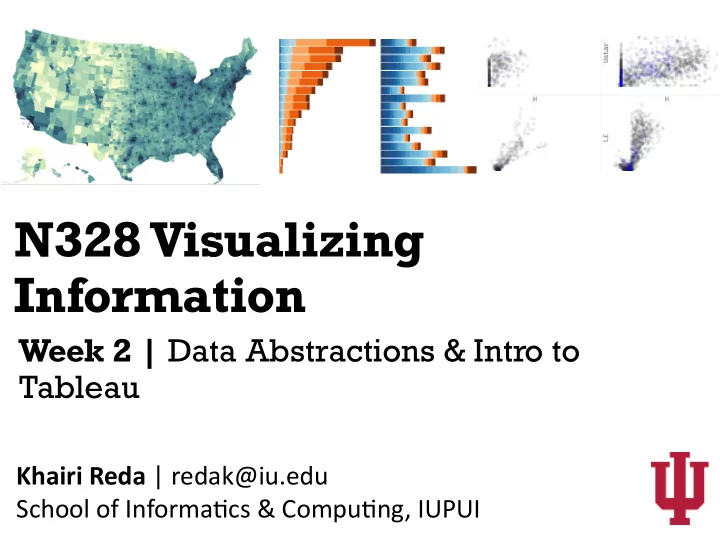

N328 Visualizing Information Week 2 | Data Abstractions & Intro to Tableau Khairi Reda | redak@iu.edu School of Informa5cs & Compu5ng, IUPUI
Assignment 1 Due Monday 11:59pm in Canvas Submit a PDF file: Visualiza5on (picture) + Writeup
Last week
Why use vision to analyze information? Seasonally adjusted unemployment rate in the US Bureau of Labor Statistics
Why use vision to analyze information?
Use visualization for confirmation • Confirm an exis5ng hypotheses • A horse will have all of its 4 Eadweard Muybridge feet off the ground at some point while galloping
Visualization can also do harm, though, if not done correctly
Space Shuttle Challenger Disaster
By E. Tufte
Miles"per"gallon" 30" 25" 20" 15" 10" 5" 0" 1978" 1979" 1980" 1981" 1982" 1983" 1984" 1985"
Based on reporting by the Guardian (https://www.theguardian.com/technology/blog/2008/jan/21/liesdamnliesandstevejobs) Via Miriah Meyer
US smart phone marketshare Slide by Miriah Meyer
US smart phone marketshare Slide by Miriah Meyer
Via Andy Johnson (https://www.evl.uic.edu/aej/424/)
Last week Principles of Visual Integrity “The representa5on of numbers, as physically measured on the surface of the graphic itself, should be directly propor5onal to the numerical quan55es represented” Avoid chartjunk* and 3D charts * Visual embellishment can in some cases improve memorability and engagement with the visualization
Via Stephen Few https://www.perceptualedge.com/articles/visual_business_intelligence/the_chartjunk_debate.pdf
This week • Modern visualizaEon tools • Tableau • Data type and semanEcs • Variable types: Categorical, Ordinal, and Quan5ta5ve variables
Quiz Two ques5ons about this week’s reading materials Will be used to mark a\endance Access code: vis02 10 minutes
Data abstraction semanEcs: the meaning behind the informa5on type: the fundamental informa5on type (e.g., number, date, string, etc…)
Basil 7 S Pear
semantics (meta data) Shirt Favorite ID Name Age Size Fruit M Apple 1 Amy 8 S Pear 2 Basil 7 M Peach 3 Clara 6 S Lychee 4 Desmond 8 L Orange 5 Fanny 7 S Pear 6 George 6 M Apple 7 Hector 10
Terminology • Items: are individual units of informa5on. For example: a rows in a table represen5ng one order out of many. • AGribute (variables, dimension): a property rela5ng to items. E.g., the shipping cost of a par5cular order
Flat Tables Key: Order ID Via Miriah Meyer
Attribute/Variable Types ✦ Categorical (Nominal, QualitaEve) A finite set of categories No implicit ordering between categories ✦ Ordered •Ordinal Implicit ordering between categories/levels, but no clear magnitude difference. Can compare and determine greater/less than •QuanEtaEve Meaningful magnitude Can do arithme5c
QuanEtaEve Data Interval vs. Ordinal ✦ Interval •Zero does not indicate an absence of detectable measurement •We can determine distance between measurement, but not propor5ons •Example: temperature, dates ✦ RaEo •The posi5on of zero indicates there is nothing of the measured en5ty •Can determine ra5o and propor5ons •Example: weight, age
Quiz What a\ribute/variable type (Categorical, Ordinal, Interval, or Ra5o) best fit the following measurements? •Speed •Facebook reac5ons (Like, Angry, Sad, etc…) •Car configura5ons (Compact, Mid-Sedan, SUV) •Product Name •IQ scores •College Majors •50-meter race 5me Based on a slide by Alex Lex
Introduction to Tableau
Download IMDB Movies dataset: research.vis.ninja
Design critique http://tinyurl.com/6mu8h63 • What is the visualiza5on about? • What data is represented in the visualiza5on? And how? • What are the interac5ons used? • What ques5ons can we answer with the visualiza5on? • Do you like the visualiza5on? • Are there any improvements that can be made to the design?
Next week Visual Percep5on
Required reading in Canvas: files/Visual thinking for design
Critiques CriEque thread posted (each week by Tuesday 11:59pm) • URL to the visualiza5on • What the visualiza5on is about • Visual encoding: describe how the data is depict in the visualiza5on • What insights did you discover from looking at the visualiza5on? • Do you like the visualiza5on? Why? What would you do to improve it? Comments due Sunday 11:59pm • Good comments: add addi5onal insights or cri5que points, answer ques5ons, provide a relevant example, etc… • Saying “I agree” is not enough; you should explain why
Recommend
More recommend